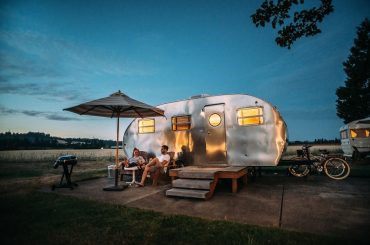Do you want to live cheaply or expensively? That is the big question most people have when it comes to whether to live inside an RV park or not. How much it costs to live in an RV park will depend on how much comfort you want to have and where the park is located at. There is no short answer.
Living in an RV park can be quite affordable. If you want to find out detailed information on the cost of living in an RV park, then keep on reading! This article’s objective is to point out a few things about living in an RV to see a better view of it.
Note: This article gives a rough estimate about the expenses related to full-time RV living. It does not provide exact numbers applicable to every situation because everyone has different budgets, does different things, and travels to different areas. This article’s advice is to provide some insight into how much you could spend living in an RV park in most areas.
Types of RV Parks
There are many different types of RV parks. There are RV sites at state and national parks, as well as privately owned RV parks, which vary widely in quality. There are many RV parks that only allow senior citizens over 55 to camp and do not allow children to attend. Some RV parks also only allow guests to stay for a maximum of two weeks due to various local and state laws regarding the establishment of tenancy and how difficult it can be to evict squatters in those areas.
Another factor that must be considered is the age of your trailer, camper van, or motor home. Many privately owned parks have policies that ban trailers and motor homes older than 10 years from parking at their sites. While these policies can feel discriminatory, RV campground managers frequently implement this policy because many RV owners do not maintain their vehicles and trailers well. A poorly maintained RV creates safety hazards for others and can upset guests who have to neighbor next to a junky camper trailer that smells of black mold and leaks sewage. In the case of camper vans and motor homes, engines often develop oil leaks that stain pavement and roads in the parks, which upsets the owners. Instead of having to do lengthy inspections of trailers and motor homes, many campground managers lazily just ban all RV older than 10 years.
Another thing that factors into the costs of living at an RV park is how long you plan to stay at one. If you stay at one location for many weeks, you will have a steady price, but if you are moving around all the time then your expenses are likely to rise.
State and National RV Parks
The price to stay at these locations varies but can be considered expensive compared to the cost of privately owned RV parks, especially considering that state and national forest parks often have few amenities. These types of parks also often do not allow for long term stays, usually limiting a person to camp at a site for only a week or two at the most. These types of sites are more popularly used by recreational RVers more than by those seeking to live full-time as an RVer, and this is primarily because of the limits placed on how long people can stay at a site in state and national parks.
Usually, when looking where to stay for the night, state and national parks are the way to go if you are looking for a cheaper option. It also depends on the area; if the park is in the midwest of the United States, it will be cheaper than the east or west coast. Parks inside states such as California can be very expensive, especially in areas that are popular among tourists due to local attractions such as theme parks, ski resorts, beaches, and such.
Privately Owned RV Parks
These are the most common types of RV parks, and they can range in sub-type.
RV Resort Parks
Many RV parks are referred to as RV resort parks, which only allow short stays and are aimed at tourists. These offer the most amenities, such as huge and lovely swimming pools and restaurants. RV resort parks are the most expensive to stay at, however, with prices ranging from $600 to as much as $1,500 a month to stay.
Senior Community RV Parks
These RV parks only permit those who are 55 years and older to stay with their RV travel trailers and motor homes. They do not allow children or young couples to stay, primarily because many elderly senior citizens do not want noisy younger people around them and strive to create communities of people of similar age and interests. Occasionally, senior restricted RV parks are also RV resort parks. This can be frustrating in some areas for younger RV owners, especially those with children, as in some states such as Arizona the majority of RV parks are age-restricted RV parks.
Mobile Home Parks
Some mobile home parks also have a small number of sites for RVs. These sites are usually meant for long term stays, not short ones. As with RV resorts, some of them can also be age-restricted communities only allowing senior citizens over the age of 55 to stay. Mobile home parks tend to be the cheaper parks to stay at, however, usually with prices below $600 a month.
RV Trailer Parks
These are the stereotypical classic trailer parks, where people who live full-time in a trailer or motor home often stay for several months or even years at a time. These tend to be the cheaper places to stay with prices ranging from $300 to $600 a month but few amenities, although they may offer on-site laundry machines at the least. These parks’ quality varies widely, with some being high crime areas and others being very quiet and safe communities to stay at. The quality of a trailer park depends largely on how diligent the RV park management is at policing these communities and not permitting trouble makers in the first place, as evictions can be a lengthy process for squatters.
Free Camping / Boondocking RV Sites
There are RV sites that allow for free camping. These RV sites are typically on publicly-owned state or federal land. The sites usually have no hookups or shore power, so staying at these places means boondocking. Boondocking is free camping and something that has become more popular as a cheap way to full-time RV, especially now that affordable solar power systems and low-voltage appliances exist that can run on them, such as compressor refrigerators and freezers that can run on DC voltage.
Cost of Utilities at RV Parks
The cost of utilities at different RV parks can vary widely, with some rapping utility costs into the price of the stay and others measuring your usage of water and electricity.
My experience has been that those RV parks which charge utilities, it will only add no more than an additional $100 to your monthly cost to stay.
Joining an RV Owner Club for Discounts at RV Parks
Many full-time RVers often join RV clubs in order to receive discounts when staying at certain RV parks — usually those who are RV resorts catered to recreational RVers.
Here is some information on the three most popular RV clubs that can provide discounts when staying at RV resort parks.
Passport America
Price: $44/ year
Passport America is one of Good Sam’s leading competitors because of the discount price, which can be 50% off the price of stays at affiliated campgrounds.
Be mindful that even though the discount price sounds nice and all, Passport America’s campgrounds are not high-end RV resorts, usually offering basic amenities.
Good Sam’s
Price: $29/year
Good Sam’s is the most popular RV club when it comes to RV membership in the country, mostly because they own Campers World stores and provide discounts for club members. Good Sam’s has millions of current members. The membership price starts at $29/year, and if you want to go 2 years then it is $50, and three-year membership is $75. In my opinion, though it offers only a 10% discount. However Good Sam’s has the largest network of any of the RV clubs.
There are many other benefits with Good Sam’s though: saving on gas and tons of coupons that can be used for shopping and dining.
Escapees
$40/year
This RV membership club brings uniqueness to the table. While Good Sam’s is about benefits and Passport America is about discounts, Escapees emphasis is the community.
Having a good community is important because humans are very sociable creatures and need other human interaction. There is an impressive number of activities, so you won’t ever be bored. That is always a plus. There are great opportunities for networking and attending special events.
They also provide roadside assistance, education courses, and RV owner training.
Fuel Expenses Related to Living at RV Parks
If you are frequently traveling around, then fuel becomes a major monthly expense for you. The cost will vary widely based on type of fuel you use (gasoline or diesel) and the current prices. in 2020 driving from Austin, Texas to Phoenix, Arizona cost me around $800 of fuel when I was driving my diesel-powered Ford F350 and hauling a 33 ft. Airstream trailer. When I made a similar trip the year before with a 1992 Ford E250 Camper van that runs on gasoline, it cost me around $600. So the price will vary some depending on how heavy your rig is, the type of fuel, the distance you travel and the price of fuel at the time you are traveling.
Because the factors vary so widely, it is difficult to provide a precise number here, but I would budget no more than $800 a month for fuel and, if you plan to travel in your RV, choose destinations that are within a few hours of the other. This way you can stay for a week or two in one location, then drive to a new destination a few hours away and stay there for a few weeks, too. This would be a more economical way of traveling in an RV full-time than taking long cross-country trips of thousands of miles.
Insurance Expenses Related to Full Time RV Living
This is the cost of your insurance on your motorhome or camper van; or your towing vehicle and your trailer. The amount of you pay per month varies depending on how much coverage you want to have, and the type of vehicle you are driving — as well as your own driving record, of course.
RV insurance expenses should also factor in the costs of your health insurance. If it’s just yourself living full time as an RVer, then the price can be relatively cheap for your health insurance coverage, but once you start adding additional people or your whole family, insurance costs greatly go up.
Generally speaking, you are roughly looking at $195-400 a month in insurance costs depending on how many people you are traveling with in your party, and the type of vehicle you are insuring. Vehicles such as Ford F350s have more expensive insurance compared to other vehicles, which is another factor to consider. Some insurance companies try to price gauge travel trailer owners who own F350s by trying to make them get commercial vehicle insurance, which is something to watch out for. Some states such as Texas have actually passed laws to prevent insurance companies from forcing private owners of F350s from exploiting RV owners, which is one reason why having your drivers license in Texas is popular among many full-time RV owners who use big trucks for towing their fifth wheels and long Airstream travel trailers.
Maintenance Expenses Related to Full-Time RV Living
Regardless of your type of RV, you will have maintenance expenses related to oil changing, fuel filters and other kinds of work.
You should expect to pay at least $600 a year in costs related to maintenance; if you have an older RV with appliances such as air conditioners and fridges go out and need replacement, expect to pay up to $3,000 the first year of ownership until all the problem areas are discovered.
I hope this article has given you some insight on the cost of living full time in RV parks.





